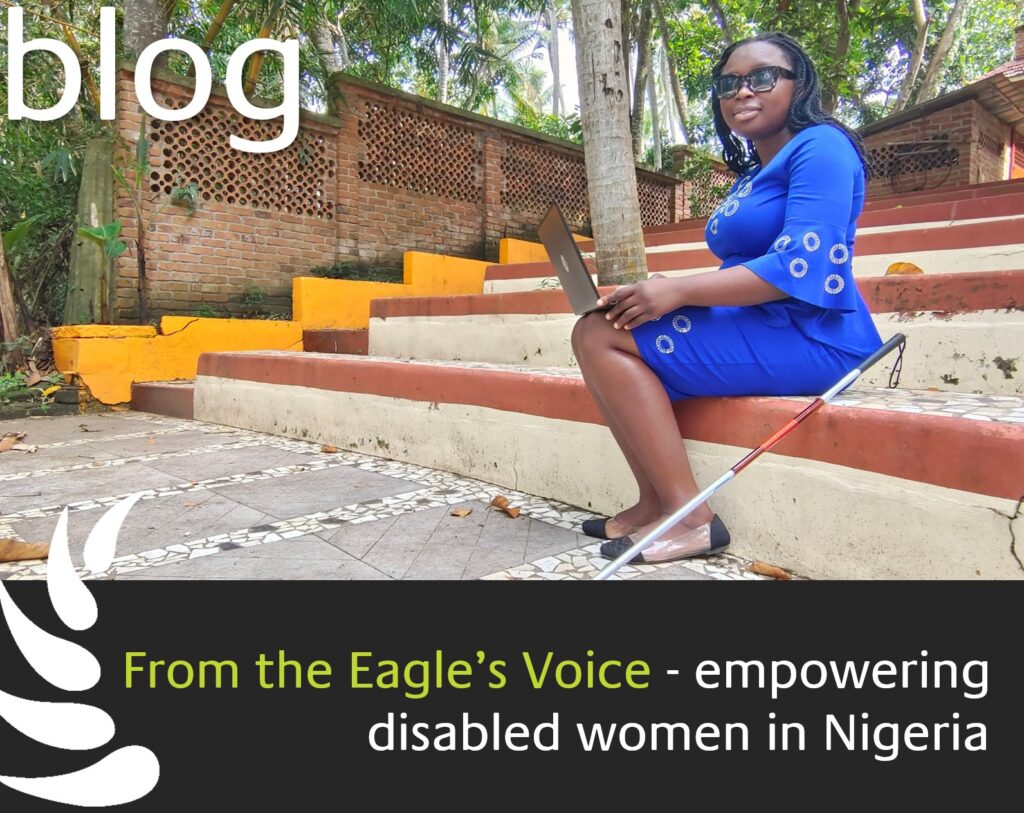Summary
At age of nine, Oluwakemi turned blind. Her father couldn't accept her blindness and took her to healers and witch doctors, but all in vain. Through her mother's support, she learned Braille and mobility skills and had the chance to go to university.
Her personal path, motivated her to start Eagle's Voice, an organization that serves as an avenue for women and girls with disabilities to redefine their status and grow into resilient leaders who do not settle for less.
– by Oluwakemi Odusanya
“Camera rolling! Three, two, One! Action!”
The Studio Signal blinks, and a special button vibrates to indicate that all microphones are ready.
“Good day, listeners of Dare to Differ! I am delighted to welcome you to our show today! And again, we have a special guest in our studio …”
Listeners can hear an amused smile, while the program jingle fades in and out, just with a click on the Braille-labelled sound-control panel.
Another scene: About 100 people are seated in a hall to inaugurate the newly appointed ministers of the federal republic of Nigeria. The MC welcomes the minister of education, “Ms. Oluwatosin!”. She enters the stage, comfortably waving at the clicking cameras, and smiling at the excited audience. In her right hand, she holds a white cane.
And again, a scene in an air-conditioned office room. Twelve serious-looking men in black suits and shiny shoes are sitting around an oval-shaped table, watching one woman in a daring colorful dress walking confidently on high heels in front of a screen with diagrams and numbers. With a friendly yet assertive voice, she explains the details of the company’s annual financial report. Her pointer is a white cane. Her notes consist of a stack of Braille sheets.
Wishful thinking? Or can this soon be a reality?
Let me take you back to my childhood.
“This cannot happen to my child! We don’t have this disease in our lineage!” The aggression and fear of my father turned towards my mother, who faced daily violence. While she hid her pain with a smile, I was confused, weeping myself to sleep every night. Little did I know that this was just a new beginning.
As a young girl, I was always my father’s favorite. He was proud of me, and since I was interested in science, he suggested I should study pharmacology.
One day, while I was trying to lite a match to prepare dinner for the family, the matchstick particles entered my left eye, which marked the start of losing my sight. Later, on my way to school, I felt dizzy. My vision was blurred, and my father gave me some herbal medicine and a tin of milk. He felt it must have been stress, not knowing that I would be diagnosed with retinal detachment. After several surgeries and a financial drain, I decided that I was done treating my eyes with surgical knives.
I struggled with low self-esteem, my education stopped, my classmates deserted me, and even my immediate cousins watched me from a distance. Everyone pretended it would be all right. While my father blamed my mother, I was taken to several herbal doctors, who made me bathe in the river, eat in the jungle, and drink all sorts of concoctions, all in a bid to restore my sight, and all for nothing.
A friend of my mother advised her to take me to the Pacelli school for blind and partially sighted children. There I got the necessary skill training. I could further my education and be integrated back into society. My mother was supportive throughout my transition. But my father remained troubled. He never accepted my blindness. Often, he beat my mother with a whip for arriving home late from the market. He ordered her to babysit her blind child. All these lowered my confidence, and most times, I just wanted to leave the house and stay far from the chaos at home. One day, he threw out my mother’s luggage and told her to leave the house. She stood her ground and said she wasn’t going anywhere.
After my high school examination, I decided to study Mass communication. During my studies, I realized there were only a few women with disabilities in university. The reasons were that some couldn’t use the computer independently; others were still battling with accepting their disabilities. Not to end up as a frustrated and lonesome blind woman, I decided to participate in every activity. In my second year, I developed a sensitization program for the campus radio. This action not only improved my communication skills, but it also built my self-confidence. The program aimed to change the mindset of the general public about disabilities.
But the best opportunity came after graduation: In Nigeria, we can opt for a National Youth Service Corps (NYSC). Graduates are posted to another state to serve for one year in a social project. I was posted to Zamfara state in Northern Nigeria; twenty-four hours drive by road from my residence. This experience strengthened my mobility skills, gave me the confidence to travel alone, and helped me further improve my communication and self-resilience skills. I realized every woman/girl with a disability must be given this opportunity to discover herself.
The Nigeria that I envision is a country where blind and partially sighted women take up leadership roles in influencing positions, such as politics, corporates, and media. But to reach this goal, we still have a long path ahead. We need drastic changes in the attitude of the patriarchal Nigerian society, and we need adequate training for blind and partially sighted women who are ready to fly and who are even able to be the voice of female leadership in Nigeria.
To equip blind and partially sighted women, we will establish a journalism school that includes a radio station. Eagle’s voice will be an incubator for blind women to step up in society, take over leadership positions, and never settle for less.



